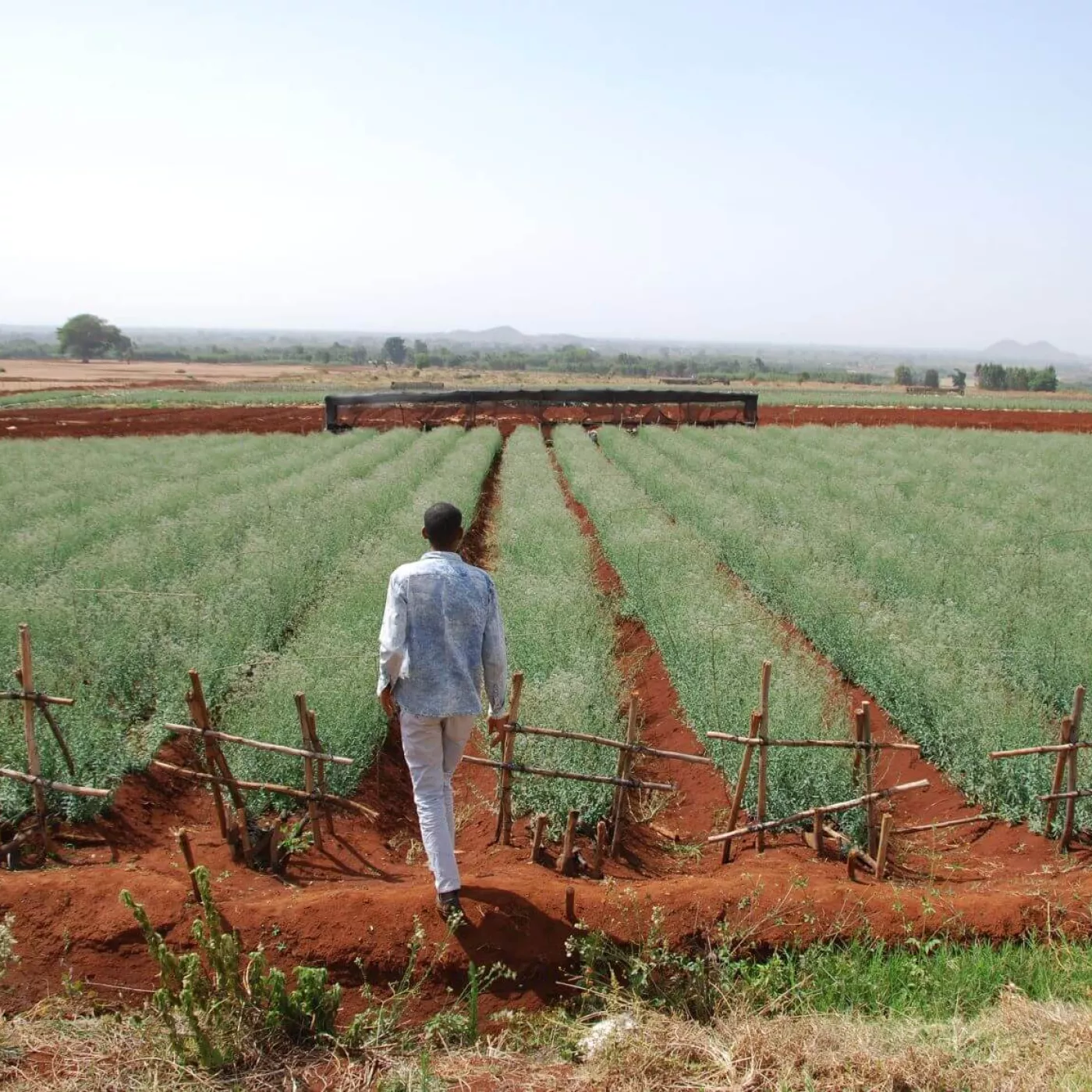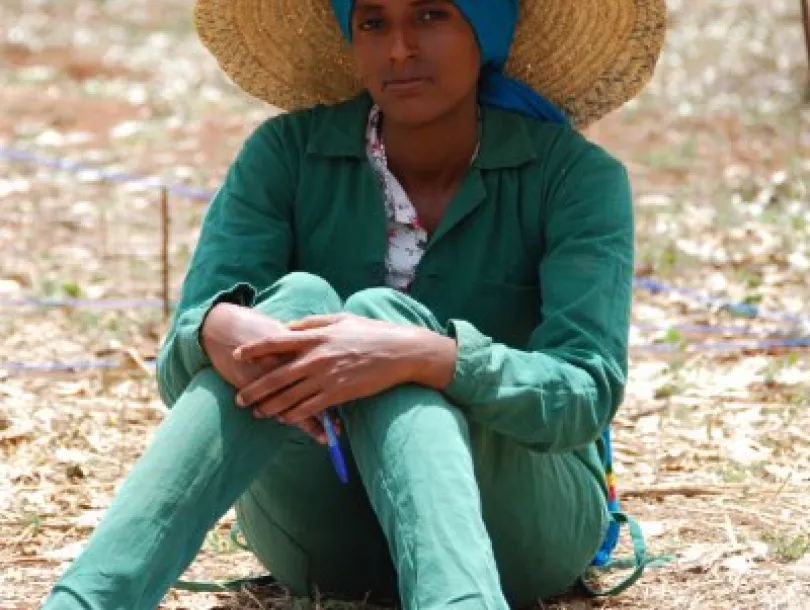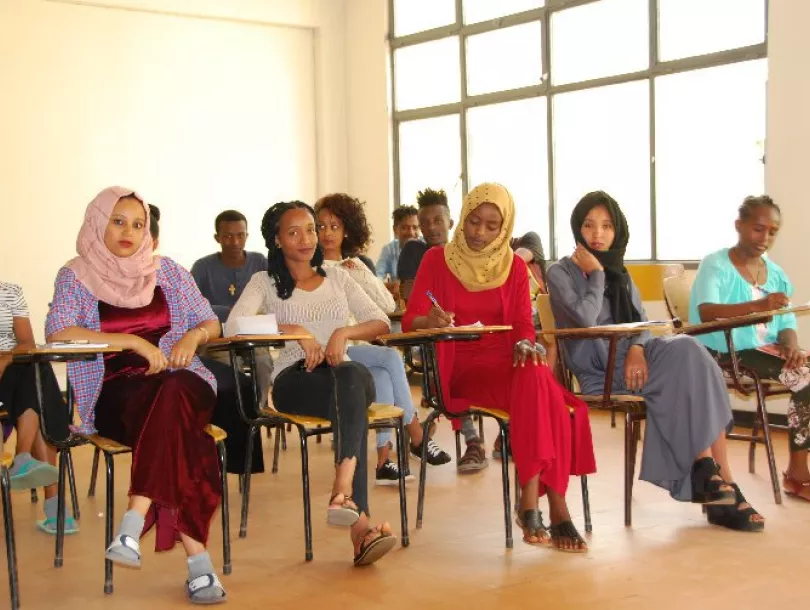Largest Orange Knowledge collaboration project kicks off in Ethiopia

The largest Orange Knowledge institutional collaboration project so far was kicked off in Addis Ababa, Ethiopia on 20 and 21 March. At the launch of 'Bright future in agriculture' over 60 representatives of Ethiopian educational institutes, the business community, various project committees, the Netherlands Embassy and a team from Nuffic were present. This impressive group of people were gathered to kick off this € 2.7m joint project aimed at strengthening agricultural TVETs in dairy and horticulture.
These people, most of whom met for the first time, will see each other a lot in the coming three years. They will set up a number of workshops, trainings, visits and knowledge exchanges before the funding of this project comes to an end in December 2021. What are their expectations and what impact will they make? What does the road towards their goal look like? We will accompany them in their journey of change to see what it takes to set this train in motion.
Connecting education to the job market
“85% of the population of Ethiopia (105 million, ed.) relies on agriculture. To face the competition as a country, we have to develop. By strengthening agri-TVETs with practical knowledge and skills, and by making them better-connected to job markets’ demands, we will become more productive and competitive.” Enyew Getnet frames the project’s relevance well in his speech at the launch. He represents Ethiopia’s Federal TVET Institute (FTI), the project owner together with Maastricht School of Management (MSM).
Huub Mudde, representing MSM, expresses his confidence in this project at the ceremony. “We have a track record of capacity-building of education in Ethiopia.” Huub has been working in Ethiopia for the past seven years, as many others from MSM before him. “We always work in partnership and together we know what our added value is. Also for this project, we have gathered many complementary partners fit for this job. Our local MSM team responsible for this project is headed by Dr Solomon Mogus, a man with extensive experience in this field. I am confident indeed that we’ll make this journey a success together.”

"Attention for gender issues is key in the Ethiopian context."
- Jolie Franke, country programme manager at Nuffic.
'Bright future in agriculture': is it a showcase?
What makes this project and this consortium attractive and promising? Jolie Franke, country programme manager at Nuffic, can explain: “What we like to see in institutional collaboration projects in the Orange Knowledge Programme is that a project is headed by a partnership of Dutch and local knowledge organisations; in this case, the FTI and MSM. Ownership in the partner country is crucial; otherwise, money is being wasted. Local parties forming coalitions to cooperate, especially with private sector like here with the dairy and horticulture associations, is valuable for matching education capacity building to the actual job market’s demands."
"Co-funding is another element that forms the basis of ownership and enhances sustainability; here, 5% of the budget is co-funded. Furthermore, the Dutch training and education input of Citaverde and Q-Point is complementary to local expertise, because of their approach in problem-based learning and practical skills development. On the Ethiopian side, higher education collaborating with TVET is also of great value, as that enables us to reach for a more holistic sectoral approach in knowledge and skill development in the agri-sector. That’s also more sustainable. Last but not least, attention for gender issues is key in the Ethiopian context.”
This focus on horticulture and dairy – how bright is their future?
Both in horticulture and dairy, the Dutch have a history and a good reputation in Ethiopia. “The Netherlands was the first European investor in Ethiopia in floriculture and the first worldwide to invest in dairy”, says Jelmer van Veen, Food and Nutrition policy officer at the Netherlands’ Embassy in Addis Ababa. Horticulture has been growing exponentially over the last decade, employing 200,000 Ethiopians in 2017/18 according to the Ethiopian Horticulture Producers and Exporters Association (EHPEA). The sector generated US$ 307 million in this period and is expected to grow further, showing a trend towards more locally owned companies.
In Ethiopia, milk consumption is remarkably low, about 20 litres per capita per year. The Food and Agriculture Organization recommends about 200 litres per capita, meaning that 22 billion litres of milk are required per year. The government is stimulating milk consumption, but to make consumers actually drink milk, the production volume needs to increase dramatically and production needs to be more regionally structured, thus reducing its price.
“Now, milk is totally unaffordable”, explains Abraham Wondirad, chair of the Ethiopian Commercial Dairy Producers Association . “For a US citizen to drink a litre of milk every day for a month, it takes about 3 hours of their minimum wage salary. In Ethiopia, it would take a whole month’s salary and still that would not cover it… To build the volume to high-quality standards and at an affordable price, we need a lot of well-educated and practically skilled people.”
Do Ethiopians want to work in agriculture?
The sectors have all the potential, but what if next-generation Ethiopians do not want to become farmers like their ancestors? What makes farming in dairy and horticulture an attractive profession? We visit one of the benefitting agri-TVETs to do a reality check.
"Our students will not only learn about improving production in quality and quantity, they will learn about entrepreneurship."

At the TVET college in Merawi, almost an hour’s drive from Bahir Dar in one of the most rural parts of the country, we meet Vice Director Kasse Ambelu and two of his teachers. His school definitely needs strengthening. He lacks the infrastructure to educate today’s students in properly equipped classrooms and does not have the capacity to offer practical training, let alone expand the number of students necessary to become more sustainable. That is a bridge too far. However, he is proud of the land that the college owns just outside the settlement.
He walks us to a green riverside area, where an orchard, vegetable beds, and fruit trees such as banana and mango grow. The neighbouring farmers let their cattle graze the school’s grassland. “There’s no money to have our own cattle for dairy training. Now, the farmers use our land, maintaining it. With the revenues of selling our crops, we can now support our college. Positive side effect of this situation is that our students learn to produce for sale.
Stride forwards
“With the ‘Bright future in agriculture’ project, we will be able to finally make that necessary stride forwards instead of barely keeping our head above the water," Kasse Ambelu explains. "We can improve our teaching facilities but also our curriculum, we can add better practical skill development and prepare them for ‘on the job’ apprenticeships. Our students will not only learn about improving production in quality and quantity, they will learn about entrepreneurship, about meeting the markets’ demands and about how to make profit out of their business."
"In the vicinity of our college, we are already cooperating with some organisations and privately owned companies like Tal Flowers, cultivating Gypsophila for the international flower market. Each week, tons of bouquets leave for the Dutch flower auction in Aalsmeer. Here, students can learn from working in a flourishing business – a positive trend attracting young Ethiopians. If we manage to build TVET capacity, focus more on practical skills needed for the job market, and collaborate with the private sector and create leverage, we see a bright future in agriculture.”
Zenaw Muluneh, the young manager of Tal Flowers, shows us around the impressive post-harvest processing halls filled with dozens of young people bunching the fragile white flowers. As a former TVET college student, he is finishing his Master’s at Bahir Dar University next to his job. His dream is to manage a plantation such as this one for himself. So, there also seems to be a bright future perspective there…
Some of the TVET students that we met in Merawi today are busy working in the blazing sun on a planning assessment for sowing. The assessor takes his time to see whether these men and women have followed instructions well. When we ask one of the girls sitting on the ground in her green overall with a big straw hat and waiting for her turn what she wants to become, she proudly says: “An agriculturist, in the modern way.”
Yes, there is a definitely bright future in agriculture ahead in Ethiopia, so hop on that train!